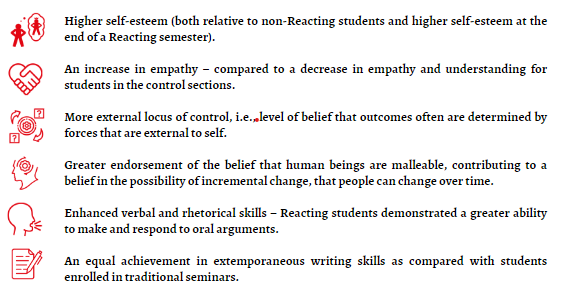| Reacting Consortium |
|
What is Reacting?
The Reacting to the Past pedagogy was pioneered in the late 1990s by Mark C. Carnes, Professor of History at Barnard College. Carnes started developing what is now known as Reacting in response to "sorta boring" college classes. As it turns out, "sorta boring" college classes could be found all over, and enterprising instructors have been eager to use Reacting and even develop their own games. Carnes decided to use role-playing to plunge students into the historical periods he was teaching them about. By giving out character roles that represented a historical figure, each with specific goals and ways to influence others, Carnes was able to engage his students in a new way. This new way of teaching history became known as "Reacting to the Past" and promoted communication, competition, and creativity among students. Since dissemination and publishing of games began in 2001, Reacting has been used by faculty at hundreds of colleges and universities in the U.S. and abroad. Today, over 30 Reacting to the Past games have been officially published, with dozens more in various stages of development. Instructors have used reacting games in virtually any history class and even in classes that focus on other subjects. With so many games and resources available, it's never been easier to use Reacting games to animate your classroom. |
Why Use Reacting?
Reacting is great for instructors who are having trouble getting their students to engage with texts and connect with them. Interactive learning techniques have been proven to improve reading comprehension and excitement in classes. Reacting in particular has helped instructors breathe new life into their classrooms; getting students across the country engaged with history. Take a look at the articles below to see how reacting can increase engagement, reading comprehension, and critical thinking in your classroom.

These results were pulled from a study on the efficacy of Reacting to the Past conducted from 1999-2006. For the full study, please see Stroessner et al., “All the World’s a Stage? Consequences of a Role-Playing Pedagogy on Psychological Factors and Writing and Rhetorical Skill in College Undergraduates,” Journal of Educational Psychology 101 (2009), 605–620.
Reacting in the News
Using Role Playing to Keep Students Engaged by Amy Curry |
Using RTTP to Foster Vigorous Active Learning by Genevieve Amaral |
Reviews of Role-Playing Classroom Games: RTTP by James A. Secord, David Pace, Yidi Wu, Jessica Blatt, Sean Jacobs, Saundra Schwartz, Rebecca Ard Boone, Suzanne M. Marilley, and M. Alison Kibler |
Read more articles featuring reacting here.
Students and Professors Respond to Reacting
"Reacting was completely unique in my college experience.... The words of Gandhi, Socrates, and other historical figures became mine, transcending the academic distance to which I had grown accustomed... Their thoughts, their histories, their biographies are real and alive in my mind."
—Amanda Houle, Barnard College alumna
“Reacting to the Past will revitalize your classroom, change you and your students—whatever you teach."
—José Bowen, Professor of Music and President of Goucher College
"I have never seen students this engaged. They write more than the assignments require; everyone, shy or not, participates vigorously in the debates. They read important texts with real understanding, making complex arguments and ideas their own."
—Larry Carver, Director of the Liberal Arts Honors Programs, University of Texas at Austin
"Once I overcame some initial anxiety and reluctance to step into my assigned role, I was swept into it by the energy of my fellow participants, by the fascinating nature of the problem we were trying to solve, and by the learning I had begun to experience long before the game started."
—James Lang, professor of English and the Director of the Center for Teaching Excellence at Assumption College
What's Next?
Using Reacting games in the classroom can be a daunting task, but there are plenty of resources to help you get started.
The FAQ for Game Masters is a great place to find answers to some of the most common questions that first-time GMs have.
Check our Resources page for a full list of instructor resources.
The Reacting Dictionary is a great resource for first-time reactors to familiarize themselves with the terms and mechanics that all reacting games use.
Our Full Game Library holds 60+ games that are ready to be played today! Or you can narrow your search to find a game that will fit perfectly in your class.
Important Considerations to Make When Using Reacting Games
While role playing can be an interactive way to teach history and build empathy, it's important to take steps that ensure students can experience reacting in a healthy way. These resources can be used to promote healthy gameplay and role playing.
by Lauren Britt Elmore, Ed.D., Harvard Graduate School of Education | by Dave Eng, EdD | by The Zinn Project |
Larp Safety Design Fundamentals by Johanna Koljonen | by Nick Proctor | Guidelines for Game Masters Addressing Discomfort by Reacting Consortium Board |
The Reacting to the Past Faculty Lounge The best source of information on using reacting games are none other than the professors who have written and used these games in their classrooms. Join the Reacting Facebook group to ask questions and see how other instructors are utilizing Reacting games. | Join the RTTP Facebook Group!
|











